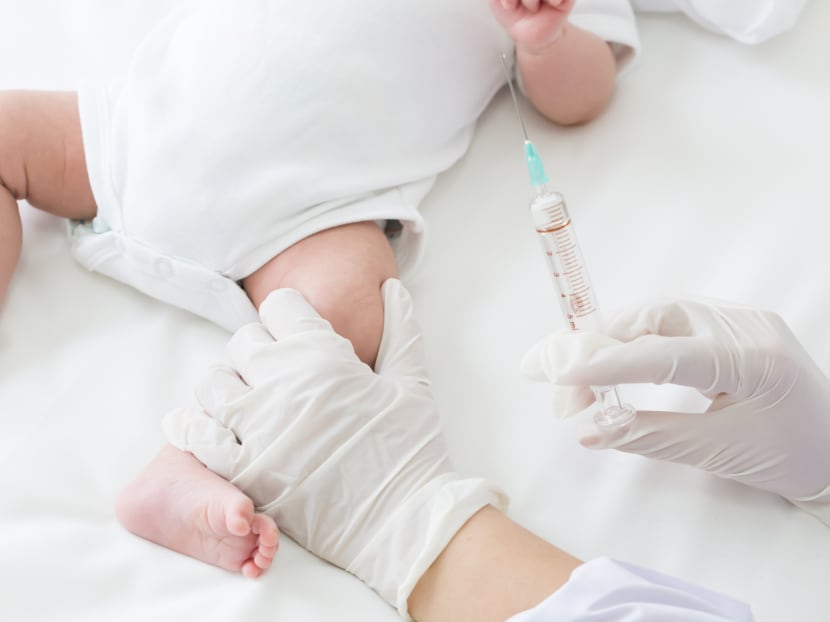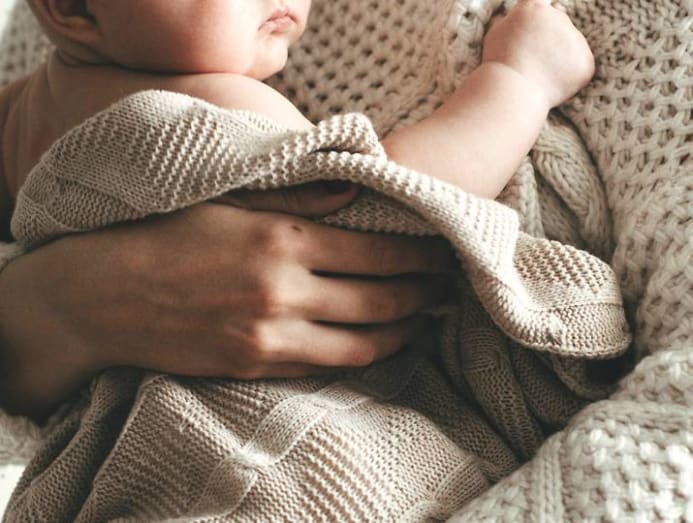Why do babies get so many vaccination jabs? And what are they for?
Advert
Wellness
Why do babies become so many vaccination jabs? And what are they for?
It may seem like your newborn is getting an injection every month. What are they for and why are they necessary?

(Photo: iStock/comzeal)
08 January 2022 06:30AM (Updated: 10 Aug 2022 03:11PM)
With news such equally the detection of polio in Sabah and the measles outbreak in Samoa that took 72 lives – mostly infants – vaccination couldn't exist more pertinent. And Singapore isn't allowed to these diseases either.
"Terminal twelvemonth, at that place appears to be a resurgence of measles, with nearly iii times every bit many cases reported in the beginning four months compared to the same period last year," said Associate Consultant Karen Donceras Nadua with KK Women's And Children's Hospital'southward (KKH) Infectious disease Service, Department Of Paediatrics. This is happening, despite the fact that immunisation for measles and diphtheria are compulsory by law in Singapore.
READ: Are two flu shots improve than ane when travelling with family during flu flavour?
"There tin be outbreaks of vaccine-preventable diseases," said Associate Professor Thoon Koh Cheng, who is senior consultant and head of KKH's Infectious Disease Service at the Section Of Paediatrics. "Nosotros need to get vaccinated not just to protect ourselves but also the rest of the community, (besides known equally indirect protection or 'herd' protection) who may not be able to get vaccinated for various reasons or may have increased gamble of disease."
WHAT DISEASES ARE THE JABS FOR?
Vaccination is a rite of passage for newborns, from the moment they are built-in until xi years erstwhile. In Singapore, the National Childhood And Adolescent Immunisation Programme protects against these 12 diseases and the health issues they can crusade:
- Tuberculosis
- Hepatitis B
- Diphtheria
- Tetanus
- Pertussis (whooping cough)
- Polio
- Haemophilus influenza type B
- Measles
- Mumps
- Rubella
- Pneumococcal infection
- Homo papillomavirus

The recommended schedule for individual vaccines beneath is for "healthy newborns starting immunisation in Singapore", said Dr Thoon. Information technology is too useful for parents whose babies missed their jabs or were born overseas to catch up on their vaccinations.
| Age | Vaccines | Diseases immunised confronting |
|---|---|---|
| At birth |
|
|
| i month |
|
|
| iii months |
|
|
| four months |
|
|
| 5 months |
|
|
| 5 to six months |
|
|
| 12 months |
|
|
| 15 to 18 months |
|
|
| xviii months |
|
|
| 10 to xi years |
|
|
| 9 to 26 years |
|
|
READ: HPV tin cause cancers in both genders – so should boys be vaccinated as well?
There are also combination vaccines (for example, the MMRV, v-in-one and 6-in-1) that parents can consider, which reduce the number of injections and trips to the doctor's office. Combination vaccines are, according to HealthHub, "newer childhood vaccine formulations" that combine "vaccines against iv, five or 6 diseases into a single injection".
Even so, these combination vaccines don't cover pneumococcal infection, human papillomavirus, as well as optional vaccines such as rotavirus disease and Hepatitis A, so parents should have annotation and discuss with the md to extend the coverage.
According to Dr Thoon, an culling schedule with combination as well as additional and optional vaccines might look like this:
| Age | Vaccines | Diseases immunised against |
|---|---|---|
| At nascency |
|
|
| 2 months |
|
|
| 4 months |
|
|
| six months |
|
|
| 12 months |
|
|
| 15 to eighteen months |
|
|
| xviii to 21 months | HepA (2nd dose; six months from outset dose) | Hepatitis A |
| ten to xi years |
|
|
WHAT TO Expect DURING YOUR BABY'S JAB Engagement
Exist prepared to soothe a crying baby for a few seconds after the injection equally the needle does cause brief pain. What are also mutual are soreness, slight redness and even a small lump only they commonly resolve on their own, according to HealthHub.

Parents should also be aware that it is normal for their child to be a little irritable for a few hours or even a day or and so after the injection. HealthHub mentioned that at that place may likewise be a slight fever (more than 38 degrees Celsius) that may last i to 2 days. To have care of that, the md may prescribe a pocket-size dose of paracetamol for pain or fever.
WHEN SHOULD YOU DELAY THE SHOTS?
Information technology is best to seek the doctor's opinion about delaying immunisation if your baby is running a high fever, according to HealthHub. Every bit of import to discuss with your doctor is when your child has had a serious reaction to a previous injection or is allergic to eggs or anything else. Those jabs tin can as well wait if your kid is being assessed or treated for whatever affliction that affects the immune arrangement.
WHAT IS THE COST?
Medisave can be used to pay for all the vaccinations nether the National Childhood Immunisation Schedule. Patients and their immediate family unit members tin employ up to S$500 per year, per Medisave account to pay for the approved vaccinations. The vaccine for human papillomavirus (HPV) is currently fully subsidised in an opt-in, school-based vaccination programme for Secondary one female students.
Withal, charges apply to optional vaccines such as chickenpox, rotavirus, Hepatitis A and meningococcal, then information technology'southward best to bank check with the doctor at selected clinics and hospitals.
Recent Searches
Trending Topics
Source: https://cnalifestyle.channelnewsasia.com/wellness/baby-vaccination-singapore-234211

0 Response to "Why do babies get so many vaccination jabs? And what are they for?"
Post a Comment